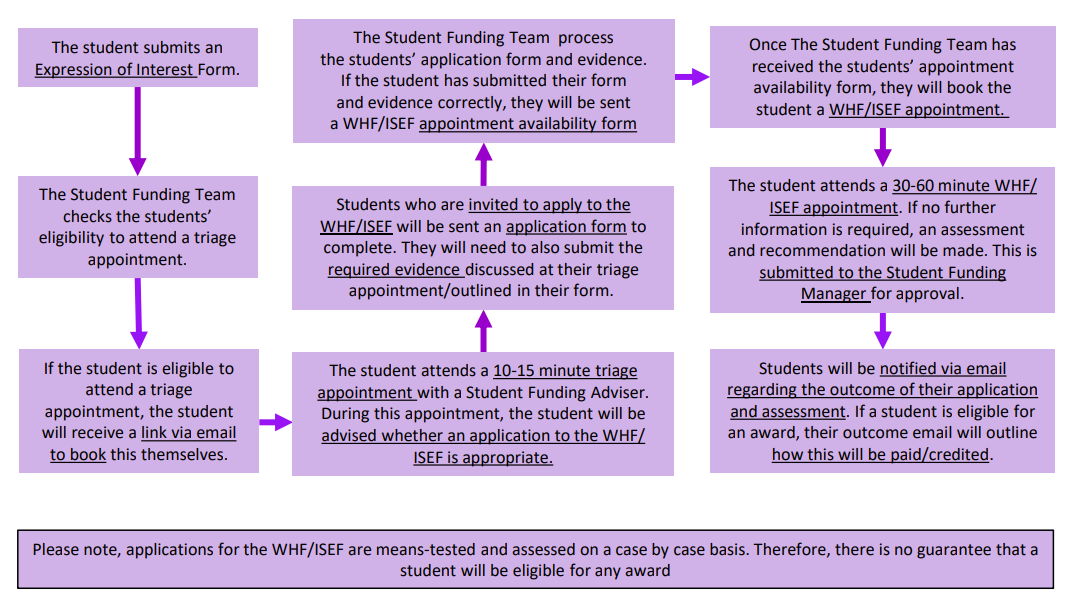Hardship Fund - The International Students' Emergency Fund - Pre-Triage
The International Students' Emergency Fund

Pre-triage
Hardship Funding
ISEF is a fund of last resort intended to provide discretionary financial help to International and EU students in situations of unexpected short-term emergency, which causes them difficulty in meeting their essential living costs (e.g., food).
- The funds available are limited and cannot be used to help with tuition fee costs or to provide any high value, ongoing support.
- Awards from ISEF are needs-related and are non-repayable.
Below you will find a flowchart which outlines the basic process of ISEF. This process is the same as the Warwick Hardship Fund (WHF) for Home students.

Triage appointments last approximately 10-15 minutes and take place over Microsoft Teams. However, if you would prefer to attend a face-to-face appointment then please let us know via email ( ) and we will try to accommodate your request.
During the appointment, your Student Funding Adviser will ask you questions regarding:
- How you are funding your course and living costs.
- The value of your current available funds (e.g., across any overdraft facilities, bank, savings, trading and cryptocurrency accounts that you may have).
- If you live with a partner, the Student Funding Adviser will also ask you about your partner's available funds (e.g., across any overdraft facilities, bank, savings, trading and cryptocurrency accounts that they may have).
- The value of your upcoming essential expenditure.
- If there are any circumstances impacting your current financial situation.
You will not need to provide any evidence for your triage appointment.
Your triage appointment is used to determine whether it is appropriate for you to make an ISEF application. If you are invited to apply, you will be advised on how to submit an ISEF application and what evidence you will be required to submit with this.
After your appointment, your Student Funding Adviser will create a report based on your appointment and assessment. This is then submitted to the Student Funding Manager for review and approval. The Student Funding Manager will also consider your best interests and works within NASMA guidelines for the assessment of awards and distribution of funds.
Providing we have received all your required documentation prior to your appointment, you will be notified of the outcome of your application via email within 10 working days.
- If your application has been successful, any award will be paid within a further 10 working days from receipt of your outcome email (providing you follow the instructions in the outcome email to submit your bank details promptly).
- Please note, we can only make payment into UK bank accounts or some digital accounts.Link opens in a new window
- We cannot make payments in cash.
Your outcome email will outline how your award will be paid. This may be paid as:
- A one-off instalment directly into your bank account.
- Multiple instalments directly into your bank account.
- Credit to a charge on your university account.
Students who are fully enrolled at Warwick Medical School may also be eligible for the WMS Student Hardship Fund.
Warwick Medical School has also created a useful Financial Advice and SupportLink opens in a new window webpage for Medical Students specifically.
Who should I contact if I have any questions?
If you have any questions related to ISEF or Student Funding in general, please do not hesitate to contact Student Funding Support:
- Email:
- Telephone: 024 7615 0096
You can also view our ISEF and ISCF Guidance Notes 2023-24 for further information.
